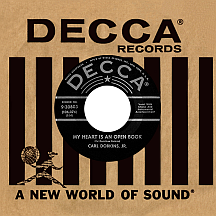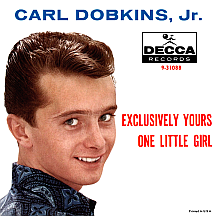CARL DOBKINS, JR.
My Heart is an Open Book
Prolific pop songwriters Hal David and Lee Pockriss composed "My Heart is an Open Book," recorded in the fall of 1958 by minor (but later bigtime) Columbia Records country star Jimmy Dean, but it wasn't the breakthrough Jimmy had hoped for. Though he wasn't impressed with the song, a high school student from Cincinnati named Carl Dobkins, Jr. took a stab at it anyway at producer Owen Bradley's suggestion. It appeared to be going down the same incinerator chute as Dean's version but gradually caught on, the benchmark of Carl's one big year that brought him another hit, lots of television exposure, a hectic touring schedule and a contrived nickname, "The Teenage Rage."
Carl cut his teeth on the ukulele as a kid, then graduated to guitar by the time he hit his teens. When he sang, his youthful voice came out sounding like Patti Page, whose method of phrasing he admired; later he copied some vocal tricks from idols Elvis and Buddy Holly, resulting in his own rock-meets-country song delivery. He made a demo recording of a couple of songs he'd written and took them around town to whoever would listen; disc jockey Gil Sheppard bit at the bait and arranged for a session with orchestra leader Lew Douglas. "That's Why I'm Asking," a catchy midtempo tune, and "Take Hold of My Hand," a ballad, came out of the session. Fraternity, one of the city's two hottest record companies, released the single and the A side received some local airplay.
With Fraternity on the fence about Carl's future, he went across town to Cincinnati's even bigger label, King Records. Two more songs he'd written were committed to tape with backing vocals from a local group, The Seniors (Keith Ross, Paul Powers and Harry Clifton), accompanied by a band called The Orbits. Sheppard managed to get this single released by Decca, one of the nation's top record companies based in New York. "If You Don't Want My Lovin'" had more of an R&B flavor than the Fraternity recordings (not surprising considering King's focus was in this field) and made some noise in a number of eastern U.S. cities in the summer of '58; Dobkins claimed it was a number one hit in Charleston, West Virginia. Harry Silverstein of Decca's artists and repertoire staff offered Carl a limited contract.
Silverstein was shooting for a nationwide hit and felt "My Heart is an Open Book" was a good choice despite Dean's inability to make it work. The recording, made in Nashville at Bradley's studio, featured members of The Anita Kerr Singers and had an arrangement more pop-oriented than the previous efforts. It was rock and roll of the least offensive kind, with a sound many anti-rock adults probably wouldn't place in a teen-corruption bag. Still, Decca met with resistance when trying to promote it to radio near the end of 1958, but they stayed the course and it finally broke nationally in April '59, fell off the chart the second week, returned, moved back down, then up, and finally got into the top 40 in June, just before Carl's high school graduation. Free of scholastic encumbrance, he was able to put all of his energy into promoting the rising hit, appearing on American Bandstand and various regional shows. In July the record entered Billboard's top ten, peaking the following month at number three for two weeks behind Paul Anka's "Lonely Boy" and Elvis's "A Big Hunk O' Love," standing firm for a third week when "There Goes My Baby" by The Drifters made a leapfrog move, blocking it from the runner-up position. "My Heart" had crossover appeal as well; it spent all of August on the R&B charts.
He had joined the U.S Army Reserves and was scheduled to leave for six months' required duty that same month, recording a few more songs in Nashville before reporting for duty. In his abscence, Decca rereleased "If You Don't Want My Lovin'," which spent a few weeks on the charts in October. "Lucky Devil" (an Aaron Schroeder-Wally Gold song), one of the pre-Army tracks, covered the same ground "My Heart" had. Debuting in December it also started slow, then spent several weeks in the top 30 in January and February 1960. Decca released an oddball EP in early '60 promoting Celanese clothing for young people ("Celanese Acetate, the Beauty Fiber"). It was called Datesetters, U.S.A. and paired Carl with Brenda Lee, hot at the time with "Sweet Nothin's" (featured on the disc with her soon-to-be chart topper "I'm Sorry"). "Lucky Devil" and "My Pledge to You" (the "Open Book" flip) were Carl's contributions to the EP. Talk about two ships that pass in the night! Brenda was at the start of a long, enduring string of hits, while Carl was on the verge of the end (so close to the beginning) of his adventure in music's ever-shifting spotlight.
Back from reserve training and ready to go, Dobkins' next single, "Exclusively Yours," leaned into teenage territory more than before (and why not? he was 18!), spending a couple of months on the lower end of the charts. His streak ended with this single, less than a year after he had sniffed the rarefied air of Presley/Anka territory. An album and five more 45s made up the remainder of his output for Decca and by early 1962 his time with the label was over. Two years passed before he made another record, "If Teardrops Were Diamonds," a pop ballad on Atco with a Vic Dana vibe. "His Loss is My Gain" came out on Colpix in '65 and had a little more bite but didn't get far. After a long hiatus he reappeared with two singles for the Chalet label in 1969: the overly sentimental "The Days of Sand and Shovels" (Bobby Vinton's version ended up being the hit) and a re-recording of "My Heart is an Open Book."
Dobkins left the music business (other than occasional performances) and went into his father's line of work, taking a job with a trucking company. Despite some solid record sales, the "big bucks" had bypassed him, yet he held no grudge. Consider this: Decca repeated the "Datesetters" promotional gimmick with Datesetters 1961 featuring four up-and-comers (Bobby Keene, Danté, Marty Evans and Benny Joy), none of whom made much, if any, impact (though Joy has a following among rockabilly enthusiasts). Carl Dobkins, Jr., on the other hand, had a fair measure of success and is well remembered for his biggest hit. He sometimes toured Europe, where he retained a sizeable fan base, and was thankful for his year of stardom - who wouldn't be?



